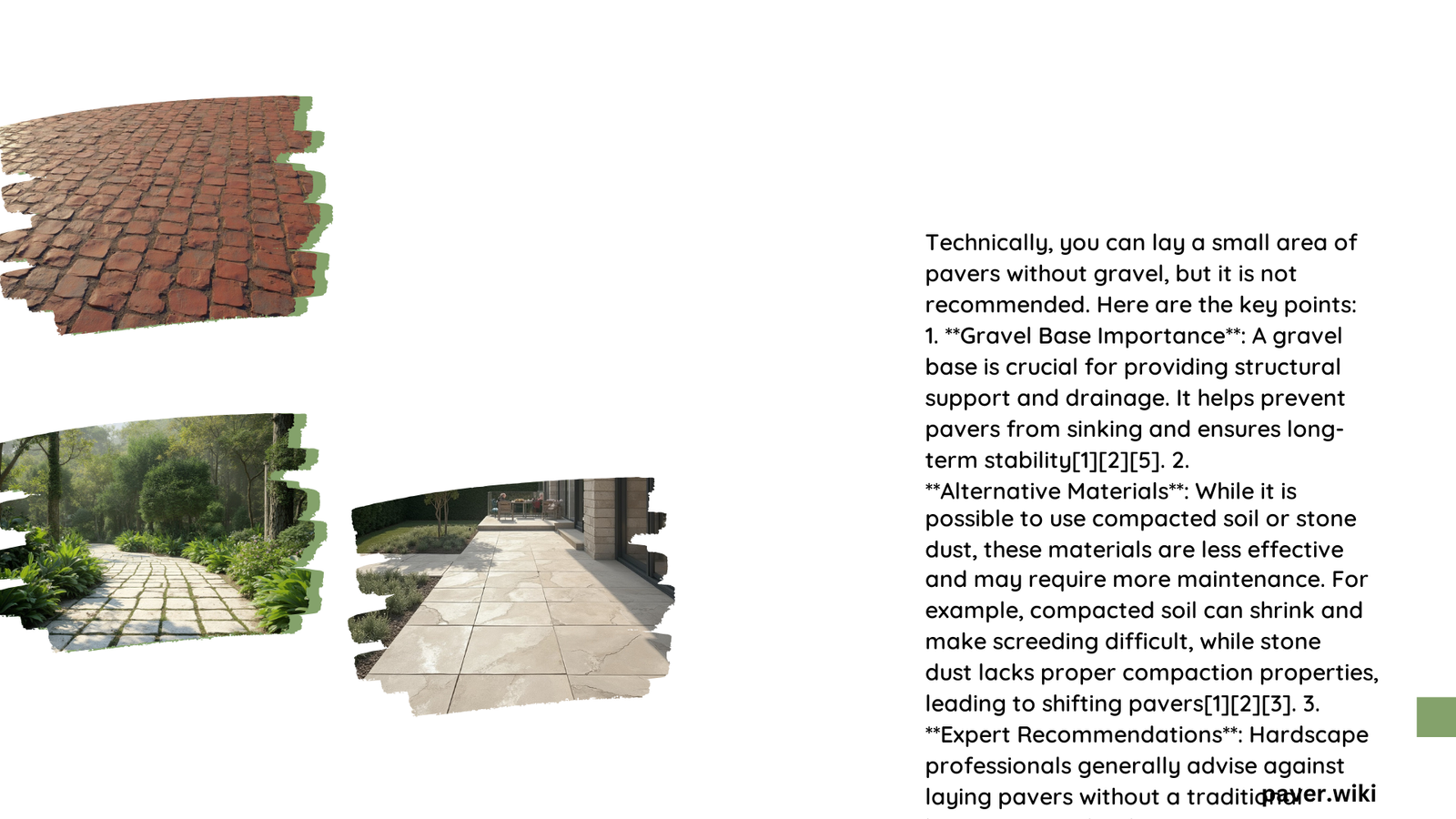Laying a small area of pavers without gravel is possible and can be an effective solution for certain projects. While traditional paver installation often involves a gravel base, alternative methods exist for smaller areas. These alternatives can provide stability and durability while potentially reducing costs and labor. This article explores various options for installing pavers without gravel in a small 10×10 ft area, including synthetic base panels, mortar over concrete, and open-graded bases.
What Are the Alternative Base Materials for Paver Installation?
When considering laying pavers without gravel, several alternative base materials can be used:
- Synthetic Paver Base Panels
- Mortar Over Concrete
- Open-Graded Base (Crushed Stone)
Let’s explore each of these options in detail.
How Do Synthetic Paver Base Panels Work?
Synthetic paver base panels are a modern alternative to traditional gravel bases. Made from high-density polypropylene, these panels offer several advantages:
- Lightweight and easy to handle
- Provide excellent stability
- Ensure proper drainage
Installation Steps:
- Lay landscape fabric over tamped soil
- Spread a 3/4-inch layer of sand
- Place synthetic base panels over the sand
- Install pavers directly onto the panels
Quantities for a 10×10 ft Area:
– Approximately 100 square feet of synthetic base panels
– 2-3 cubic feet of all-purpose sand
Can I Use Mortar Over Concrete for Paver Installation?
If you have an existing concrete surface, using mortar to install pavers can be an effective method:
Installation Process:
1. Clean the concrete surface thoroughly
2. Apply a 1/2-inch layer of latex-modified mortar under each paver
3. Adhere pavers to the concrete
4. Fill joints with the same mortar
5. Remove excess mortar after drying
Quantities for a 10×10 ft Area:
– Calculate mortar amount based on thickness and coverage area
– Typically, one bag of mortar covers 10-20 square feet
What Is an Open-Graded Base and How Does It Work?
An open-graded base uses crushed stone as an alternative to traditional gravel:
Installation Steps:
1. Lay a layer of 1/4″-10 crushed gravel or stone
2. Compact the base layer
3. Add a 1-inch layer of sand and screed
4. Install pavers on top of the sand layer
Quantities for a 10×10 ft Area:
– 1-2 cubic yards of crushed stone (depending on depth)
– 2-3 cubic feet of all-purpose sand
How Do These Methods Compare in Terms of Durability?

| Method | Durability | Challenges |
|---|---|---|
| Synthetic Base Panels | Good load distribution and drainage | Higher upfront cost, potentially less durable long-term |
| Mortar Over Concrete | Durable if concrete is in good condition | Requires careful application, may not work on uneven surfaces |
| Open-Graded Base | Good drainage, forgiving installation | May require more maintenance to prevent weed growth |
What Are the Cost Implications of These Alternative Methods?
Synthetic Base Panels
- Cost range: $500 to $1,000 for a 10×10 ft area
- Lower labor costs due to easy installation
Mortar Over Concrete
- Mortar costs: $100 to $300 for a 10×10 ft area
- Labor costs vary based on concrete condition
Open-Graded Base
- Material costs: $300 to $600 for a 10×10 ft area
- Labor costs depend on excavation and compaction needs
How Long Does Installation Take for Each Method?
- Synthetic Base Panels: 1-2 days for a 10×10 ft area
- Mortar Over Concrete: 1-3 days, including mortar drying time
- Open-Graded Base: 2-4 days, including base preparation and compaction
What Are the Key Considerations When Choosing a Method?
When deciding whether to lay a small area of pavers without gravel, consider:
- Existing surface conditions
- Budget constraints
- Desired durability and longevity
- Available installation time
- Local climate and drainage requirements
By carefully evaluating these factors, you can choose the most suitable method for your specific project needs.
References:
1. Family Handyman – How to Install a Paver Patio Base
2. SS Pavers – Laying Pavers Without Sand: Is It Possible?
3. Western Interlock – What Kind of Base Should You Use for Patio Pavers Installation?
